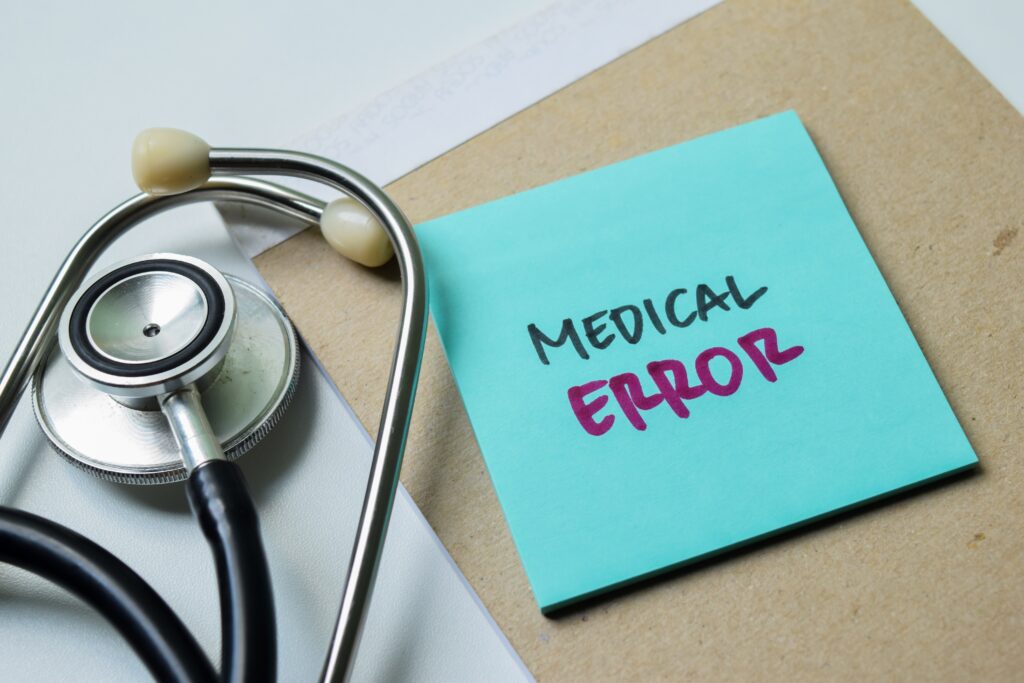What Happens in a Malpractice Lawsuit?
Gregg Hollander | December 13, 2024 | Medical Malpractice

When you seek medical care, you rightfully and naturally expect that the professionals treating you know what they are doing and will act in your best interest. However, sometimes, this isn’t true, and innocent patients suffer serious injuries as a result. As such, those who are injured have many legal rights. However, medical malpractice lawsuits can be difficult and emotionally taxing. That’s why if you are pursuing a medical malpractice claim, it’s always in your best interest to hire a skilled Fort Lauderdale medical malpractice lawyer.
What is Medical Malpractice?
Medical malpractice occurs when a healthcare professional’s negligence leads to patient harm. This can arise from errors in diagnosis, treatment, aftercare, or health management. For a claim to qualify as medical malpractice, certain conditions must be met, including proving that the medical provider breached their duty to provide competent care, that this breach directly caused the injury, and that significant harm resulted.
Types of Medical Malpractice
Misdiagnosis or Delayed Diagnosis
Misdiagnosis is one of the most common types of malpractice. When a condition is not correctly diagnosed or diagnosed too late, treatment can be delayed, worsening the patient’s health. For instance, misdiagnosing a heart attack as indigestion can lead to fatal consequences.
Surgical Errors
Mistakes during surgery can involve:
- Operating on the wrong body part.
- Leaving instruments inside the body.
- Causing unintended injury to nearby organs.
These errors are often avoidable and can lead to severe complications or additional surgeries.
Medication Errors

Medication errors occur when a patient is given the wrong drug, incorrect dosage, or improper instructions. These can lead to adverse effects or failed treatment. Medication errors may occur at any point, from prescribing to administering the medication.
Anesthesia Errors
Errors in administering anesthesia can lead to serious complications, including brain damage or even death. Common mistakes include incorrect dosages, failure to review the patient’s medical history, or inadequate monitoring during surgery.
Childbirth Injuries
Negligence during pregnancy or delivery can result in harm to both mother and child, including conditions like cerebral palsy or nerve damage. These injuries can stem from improper use of forceps, failure to monitor vital signs, or delayed emergency C-sections.
Failure to Treat
When healthcare providers accurately diagnose a condition but fail to recommend appropriate treatment, it is considered a failure to treat. This often happens when a doctor does not follow up adequately, dismisses symptoms, or has too many patients to provide individual care.
Medical malpractice cases are complex and require proof that the standard of care was not met. Consulting an experienced medical malpractice attorney can help victims understand their rights and pursue compensation for the harm they suffered.
The Medical Malpractice Claim Legal Process
Initial Consultation: Assessing the Case’s Viability
The attorney’s assessment during an initial consultation is imperative for understanding whether a case is worth pursuing. This consultation is typically free and serves as a way for the attorney to gauge the strength of the case by reviewing the patient’s medical records, the nature of the injury, and other factors. An attorney can offer invaluable insights into the probability of success and outline the steps ahead.
Clients often hesitate due to misconceptions about medical malpractice cases, such as believing that all negative medical outcomes qualify as malpractice or that suing a doctor is unethical. A malpractice attorney clarifies these issues, helping clients understand that valid claims are rooted in apparent breaches of professional duty and that they have legal rights.
Extensive Evidence Gathering: Building a Strong Foundation
The success of a malpractice case relies on robust, persuasive evidence. Medical malpractice attorneys gather evidence by:
- Detailed Medical Records: Attorneys may request an entire history of the patient’s treatments, including hospital visits, prescribed medications, test results, and other relevant medical documentation. These records allow attorneys to pinpoint where the alleged negligence occurred.
- Engaging Multiple Experts: Expert witnesses include doctors and may also include nurses, therapists, and other medical professionals. Attorneys often consult with more than one expert to corroborate that the defendant’s actions were indeed negligent.
- Reviewing Other Legal Precedents: A comprehensive understanding of similar cases helps an attorney build a strategy that accounts for legal precedents. By examining previous rulings, attorneys identify which arguments are most likely to succeed.
The extensive nature of evidence-gathering is one reason malpractice cases are time-consuming and complicated. This process is invaluable for a successful outcome, as it strengthens the injured party’s case. It’s also why most medical malpractice claimants hire an attorney, as this process typically requires professional knowledge and countless hours of research and work.
Statute of Limitations and Filing the Lawsuit
It’s critical to file the case within the statute of limitations, which varies by jurisdiction. Attorneys focusing on malpractice cases are well-versed in these legal time limits and ensure cases are filed promptly. Missing this deadline can lead to a dismissal, so timely legal advice is vital.
In the complaint, the attorney lays out a straightforward narrative of how the alleged malpractice caused harm, including specific details about damages. This complaint often serves as the foundation of the entire case, giving the judge and jury an initial understanding of the plaintiff’s grievances. The case may lack direction without a properly structured complaint, so an attorney’s skill is invaluable at this early stage.
Responding to Defenses Raised by Healthcare Providers
Once a lawsuit is filed, healthcare providers may argue several defenses, such as claiming the injury was due to pre-existing conditions or asserting that the standard of care was met. These defenses can be challenging to refute, especially when they involve intricate medical details.
A medical malpractice attorney prepares to counter these defenses by gathering evidence that undermines the credibility of the provider’s arguments. For instance, they may obtain testimonies from other healthcare professionals who confirm that the defendant’s actions were substandard.
Discovery Phase: Interrogatories, Depositions, and Evidence Sharing
The discovery phase can take months or even years in detailed cases. Here’s a more in-depth look at how this stage unfolds:
- Document Exchange: Both parties exchange documents relevant to the case, from medical records to procedural manuals. This process can reveal additional evidence supporting the plaintiff’s claim.
- Depositions as Key Evidence: Depositions are often conducted with both medical staff and witnesses to obtain clear, sworn testimonies. Attorneys use depositions to create a timeline, clarify details, and extract information that may not be in the written records. Skilled attorneys know how to ask targeted questions to uncover inconsistencies.
- Preparation for Cross-Examination: Attorneys prepare meticulously to cross-examine the defense’s witnesses during the trial, often simulating the deposition process to anticipate answers. This practice is necessary to maintain control during the trial and ensure that the defense does not present misleading or irrelevant information.
Negotiating a Settlement: Weighing the Pros and Cons
Negotiations are common in malpractice cases, and many cases settle before trial. Here’s why negotiation is so critical:
- Understanding Compensation Needs: Attorneys assess their clients’ total losses, including future medical expenses and emotional pain. These projections guide negotiations to ensure fair compensation.
- Avoiding Unpredictable Trial Outcomes: Trials can be unpredictable, especially when it comes to jury decisions. Settlements provide a guaranteed outcome, which many clients prefer for the sake of certainty and expediency.
- Maximizing Client Benefit: Settlement discussions may occur several times before an agreement is reached, and reputable attorneys are adept at pushing for the best offer without risking trial if unnecessary.
Most medical malpractice claims end in a settlement, although some do go to court and are determined by a jury. A settlement can benefit plaintiffs who want to avoid the emotional toll of trial and obtain compensation faster. However, attorneys also ensure clients understand that they may forfeit the possibility of higher damages by settling.
Trial Preparation: Crafting a Persuasive Argument
Trial preparation in malpractice cases often involves creating an engaging and clear narrative that resonates with the jury. Here’s a closer look at this critical stage:
- Simplifying Medical Jargon: Attorneys know that jurors may not be familiar with medical terminology, so they practice explaining medical procedures in layperson’s terms. A jury understanding the technicalities is likelier to sympathize with the plaintiff.
- Building a Compelling Story: Effective attorneys present the case as a story, focusing on the emotional impact of the malpractice on the patient’s life. This narrative approach can be especially persuasive in swaying jurors.
- Mock Trials: Many attorneys conduct mock trials to anticipate potential weaknesses. This preparation allows them to refine their strategies and address any issues before the actual trial.
A knowledgeable medical malpractice attorney’s efforts during trial preparation can make a significant difference, setting the stage for a compelling presentation of the case.
Trial Process: Presenting and Defending the Case
Trials can be lengthy, with each side presenting evidence, calling witnesses, and cross-examining the opposing side’s witnesses. Here’s how an attorney handles this process:
- Presenting Evidence: Attorneys use documents, charts, and visuals to support their case. Visual aids can clarify complicated points and make the evidence more accessible to the jury.
- Witnesses and Experts: Expert witnesses explain technical details, while other witnesses may describe the plaintiff’s struggles. Attorneys carefully plan the sequence of witness testimony to build a cohesive narrative.
- Countering Defense Arguments: When the defense raises alternate theories, such as pre-existing conditions, attorneys are prepared to dispute these claims with counter-evidence. This rebuttal phase is vital for keeping the jury focused on the provider’s responsibility.
The attorney’s role is to argue the facts and keep the jury engaged and convinced that negligence occurred.
Jury Deliberation and Verdict
After closing arguments, the jury deliberates, deciding whether the healthcare provider’s actions constituted malpractice. The quality of the attorney’s presentation can be a deciding factor in the outcome. Attorneys prepare for all possible verdicts and discuss potential appeals if the decision is unfavorable.
If the verdict is favorable, the court will then determine the damages awarded. An attorney can argue for higher damages by detailing the lasting impact on the client’s life, maximizing the compensation.
Types of Damages in Malpractice Cases
A successful medical malpractice lawsuit may result in compensation, including:
- Economic Damages: These include actual expenses like medical bills, rehabilitation costs, and lost income.
- Non-Economic Damages: Attorneys argue for compensation for pain and suffering, emphasizing the emotional and physical hardships endured.
- Future Costs: Medical malpractice attorneys anticipate the client’s future needs and ensure these costs are factored into the compensation request.
Some cases may qualify for punitive damages, intended to punish particularly egregious behavior, though these are rare.
Appeals and Further Legal Options
If either party disagrees with the verdict, they may appeal the decision. Appeals focus on legal errors, not factual issues, and are common when a party believes the law was improperly applied.
A knowledgeable medical malpractice attorney can advise on whether an appeal is appropriate and represent the client in appellate court if necessary. Appeals may prolong the case, but they can be worthwhile if solid grounds exist for contesting the verdict.
Why Contact a Medical Malpractice Attorney?

Medical malpractice cases are intricate and challenging, requiring not only experienced legal insight but also technical medical knowledge. Here’s why contacting a malpractice attorney is essential:
- Guidance Through Complex Legal Processes: From the initial consultation to trial and beyond, an attorney ensures that clients understand their rights and options.
- Resource Access: Attorneys can engage credible experts, obtain valuable documentation, and negotiate effectively with insurers.
- Advocating for Fair Compensation: A seasoned attorney understands the value of the client’s claim and negotiates assertively or advocates powerfully in court to secure a fair outcome.
Attempting a malpractice lawsuit without legal representation is difficult and often less successful. A qualified medical malpractice attorney provides the support and skills necessary to navigate the legal system confidently and successfully.
Seek Experienced Legal Support for Your Malpractice Claim Today
If you or a loved one has suffered due to medical negligence, don’t hesitate to seek help. A medical malpractice attorney offers invaluable oversight, handling the many challenges and details of malpractice cases. Their goal is to alleviate the burden on you, allowing you to focus on recovery while pursuing the compensation you deserve. If you believe you or a family member has suffered injury from a medical malpractice action, it’s in your best interest to contact a well-versed Fort Lauderdale personal injury attorney as soon as possible. The sooner you contact one, the better the outcome of your case will be, and the sooner you can alleviate some of your stress.
